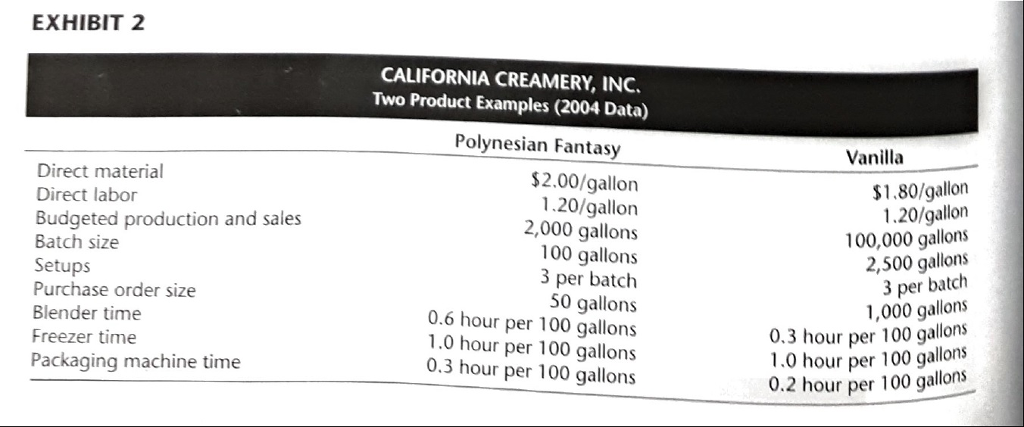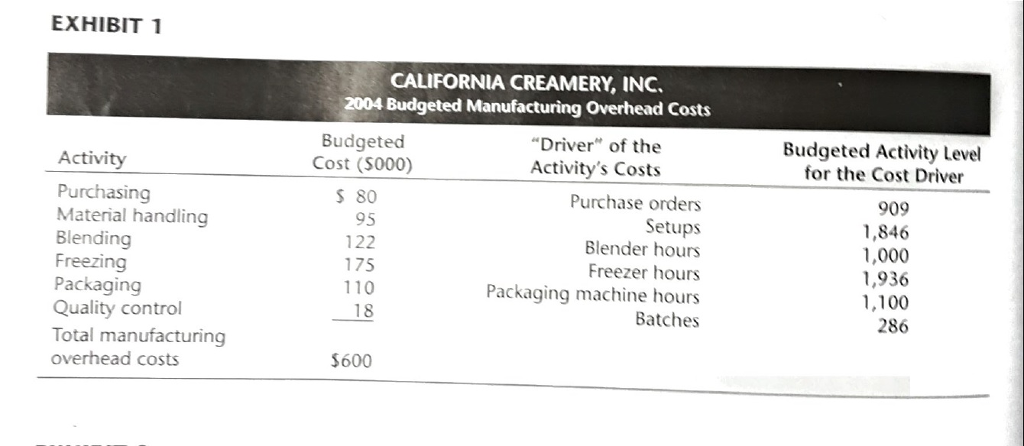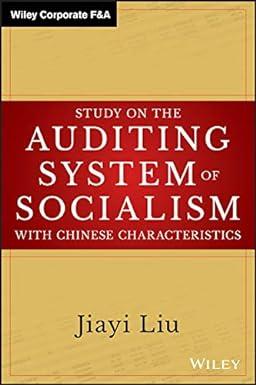Question
California Creamery, Inc. (CCI) owned and operated 14 retail ice cream stores spread throughout Southern California, from San Luis Obispo to San Diego. CCI's stores

 California Creamery, Inc. (CCI) owned and operated 14 retail ice cream stores spread throughout Southern California, from San Luis Obispo to San Diego. CCI's stores sold only the highest quality, ultra-premium ice cream. They offered 25 different ice cream flavors. Many of the CCI flavors were exotic, such as Polynesian Fantasy, Mango-Lemon Supreme, and Multi-Nut Twist. But CCI also sold a few traditional ice cream flavors, such as vanilla, chocolate, strawberry, and coffee. Some of the flavors were very popular, but a few of the exotic flavors sold in low volumes. CCI produced its own ice cream. Originally the ice cream was produced in the garage of the company's founder, Will Forgey. But the company outgrew the garage, and Will had since leased a building to house CCI's production activities. As CCI had grown, Will had been able to afford more expensive, automated manufacturing equipment that blended the flavors and packaged the liquid ice cream in preparation for freezing. CCI's most significant production costs were for raw materials, particularly cream, sugar, and the special flavor ingredients, and for the acquisition, operation, and maintenance of the production equipment. All of CCI's products were sold at the same retail price. Will set the prices to yield, roughly, a markup of 100% on average full production costs. CCI's 2004 budget included manufacturing overhead of $600,000. To estimate product costs, Will spread this overhead cost to products based on a proportion of the direct labor used in the production process. CCI's total direct labor cost for 2004 was $300,000, so Will charged the overhead to products at a rate of 200% of direct labor costs. One day in a casual conversation, Louise Fettinger, Will's neighbor and a controller of a small manufacturing company, suggested that Will's pricing policy was not very smart. Louise's intuition was that the costs of producing CCI's various flavors were very different. She thought those differences should be reflected in the prices charged, or CCI's profits would vary as the mix of products sold varied.
California Creamery, Inc. (CCI) owned and operated 14 retail ice cream stores spread throughout Southern California, from San Luis Obispo to San Diego. CCI's stores sold only the highest quality, ultra-premium ice cream. They offered 25 different ice cream flavors. Many of the CCI flavors were exotic, such as Polynesian Fantasy, Mango-Lemon Supreme, and Multi-Nut Twist. But CCI also sold a few traditional ice cream flavors, such as vanilla, chocolate, strawberry, and coffee. Some of the flavors were very popular, but a few of the exotic flavors sold in low volumes. CCI produced its own ice cream. Originally the ice cream was produced in the garage of the company's founder, Will Forgey. But the company outgrew the garage, and Will had since leased a building to house CCI's production activities. As CCI had grown, Will had been able to afford more expensive, automated manufacturing equipment that blended the flavors and packaged the liquid ice cream in preparation for freezing. CCI's most significant production costs were for raw materials, particularly cream, sugar, and the special flavor ingredients, and for the acquisition, operation, and maintenance of the production equipment. All of CCI's products were sold at the same retail price. Will set the prices to yield, roughly, a markup of 100% on average full production costs. CCI's 2004 budget included manufacturing overhead of $600,000. To estimate product costs, Will spread this overhead cost to products based on a proportion of the direct labor used in the production process. CCI's total direct labor cost for 2004 was $300,000, so Will charged the overhead to products at a rate of 200% of direct labor costs. One day in a casual conversation, Louise Fettinger, Will's neighbor and a controller of a small manufacturing company, suggested that Will's pricing policy was not very smart. Louise's intuition was that the costs of producing CCI's various flavors were very different. She thought those differences should be reflected in the prices charged, or CCI's profits would vary as the mix of products sold varied.
Question: 1.
Compute the full production cost (per gallon) of the Polynesian Fantasy and Vanilla products using:
a) Wills old costing method;
b) The new costing method (Louises suggestion).
What are the effects, if any, of changing the companys costing method? Specifically, are the differences between the two costing methods material in terms of:
a) Their effect on individual product costs?
b) Their effect on total company profits? (Assume no changes in any operating decisions, such as prices and production volume)
If there are material differences, why do they exist? If there are no material differences, why do they not exist?
What should Will do now? Explain.
EXHIBIT 2 Direct material Direct labor Budgeted production and sales Batch size Setups Purchase order size Blender time Freezer time Packaging machine time CALIFORNIA CREAMERY, INC. Two Product Examples (2004 Data) Polynesian Fantasy $2.00/gallon 1.20/ gallon 2,000 gallons 100 gallons 3 per batch 50 gallons 0.6 hour per 100 gallons 1.00 hour per 100 gallons 0.3 hour per 100 gallons Vanilla $1.80/gallon 1.20/gallon 100,000 gallons 2,500 gallons 3 per batch 1,000 gallons 0.3 hour per 100 gallons 1.0 hour per 100 gallons 0.2 hour per 100 gallons
Step by Step Solution
There are 3 Steps involved in it
Step: 1

Get Instant Access to Expert-Tailored Solutions
See step-by-step solutions with expert insights and AI powered tools for academic success
Step: 2

Step: 3

Ace Your Homework with AI
Get the answers you need in no time with our AI-driven, step-by-step assistance
Get Started


